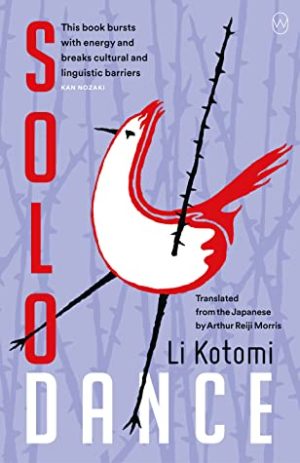You have no items in your cart. Want to get some nice things?
Go shopping
Civil rights campaigns are a long process. There was over a century between The Emancipation Proclamation, which ended slavery in the United States, and the Civil Rights Act, which ended segregation. In the United Kingdom, there was over half a century between women getting the vote and the Equal Pay Act, and it is widely agreed that feminism is still very much needed.
For all its size and diversity, Asia lags far behind the Anglophone world in the rights of same sex couples to marry. In 2019, Taiwan became the first Asian country to legalise same-sex unions, but some foreign nationals still face obstacles in having them recognised. Campaigns in The Philippines, Hong Kong and Thailand have so far fallen short for gay couples who wish to wed. In ‘Solo Dance’, by Li Kotomi, a novel newly translated from Japanese, Japan – Asia’s most advanced country – is described as a “queer desert.” The novel’s protagonist, Cho Norie, is a lesbian woman who spent her early life in Taiwan and went on to live and work in Japan, like the novel’s author.
Cho Norie has two main obsessions. One of them is death, and the other is keeping her love life a secret from her Japanese colleagues, whom she sees as conformist and group-minded. She first discovers her attraction to her own sex when in fourth grade she meets Shi Danchen, whose “black pupils” remind her of a “quiet lake, illuminated by the moon.” Danchen dies in a gruesome motorcycle accident and, despite being “too young to understand the meaning of love,” Cho Norie develops a lifelong obsession with her.
The real inciting incident is the most harrowing, and one of the most powerfully-written, scenes in the novel. In just three paragraphs at the end of Chapter 8, Cho Norie is raped while walking home through an unlit alley. The parting words of her attacker, whose “horrid breath carried with it the smell of decay, like that of rotting fish,” are “Don’t like men, eh, you fucking dyke? Well, I’ll show you a good time…”
At the beginning of the following chapter, she ruminates on whether her sexual orientation is partly to blame for her fate. She is also bedeviled with unrequited love that wells up “just as sediments build in a river that cannot reach a sea.” Eventually, the protagonist decides that the best way to bring meaning to her life is to end it while still in her twenties, like the pioneering Taiwanese novelist Qiu Miaojin who had an unapologetically lesbian sensibility and was a huge influence over the character and, we can assume, the author.
Kurt Vonnegut advised writers to “make every character want something, even if it’s just a glass of water.” Cho Norie is far from being a go-getter, and for this reason, the plot sometimes lacks motive force. Despite this, ‘Solo Dance’ is always readable. The neat no-nonsense prose and psychological insights keep the book ticking along. The central theme is a profound philosophical question but like most good fiction, it does not hit the reader over the head with its profundity.
As Albert Camus observed, “there is but one truly serious philosophical problem, and that is suicide,” and the question of whether or not to go through with it is what motivates the main character here. She comes up with a plan: “Attend the world’s biggest pride parade before dying the next day – surely that was a way to bloom beautifully before dying.”
In Japan, where the character spends her working life, the suicide rate was for a long time much higher than almost any other developed country. Since 2020, there has been a sudden increase in female suicides. Cho Norie’s heroine Qiu Miaojn was far from alone in being a major modern Chinese-speaking writer whose suicide enhanced their mythology. There is also the novelist and memoirist San Mao, and the poet Hai Zi, among many others.
The prose, as translated by Arthur Reiji Morris, is generally no-nonsense but does allow itself the occasional flourish. For example, when contemplating death, “as she thought on this, her heart grew clear, like a silent lake.” Having started learning Japanese at age 15, Li Kotomi has since become only the second non-native speaker in history to win the Akutagawa Prize. At the ceremony in 2021, she told media “I am proud that each of our works is updating the Japanese literature”. This puts her in the company of Vladimir Nabokov and Joseph Conrad in winning great acclaim for writing in a foreign language. For all the awards and fanfare Li Kotomi has won since finishing Solo Dance, she explains in a subtitled video interview that this is the one that means the most to her, strongly hinting that in her own life, she went through pain and suffering very similar to that experienced by her character.
The twenty-first century is set to be an Asian one. As Asian influence looms larger, it is important to understand how different other societies can be. The general lack of gay rights in East Asia shows that social change does not always neatly follow economic development.
By Li Kotomi
Translated from the Japanese by Arthur Reiji Morris
World Editions, 256 pages
Kevin McGeary
Kevin is a short story writer, essayist, translator, educator, and singer-songwriter. His debut short story collection, 'The Naked Wedding', is available on Amazon. His Chinese-language songwriting has been the subject of features in international media, and he frequently organises performs music and comedy events around Manchester.
- Web |
- YouTube |
- More Posts(1)




